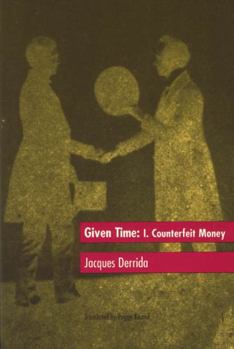Given Time: I. Counterfeit Money
Select Format
Select Condition 
Book Overview
Is giving possible? Is it possible to give without immediately entering into a circle of exchange that turns the gift into a debt to be returned? This question leads Jacques Derrida to make out an... This description may be from another edition of this product.
Format:Paperback
Language:English
ISBN:0226143147
ISBN13:9780226143149
Release Date:September 1994
Publisher:University of Chicago Press
Length:182 Pages
Weight:0.71 lbs.
Dimensions:0.7" x 6.0" x 9.0"
Customer Reviews
1 rating
A matrix of Derrida's early programmatic texts and thought
Published by Thriftbooks.com User , 20 years ago
If there could be such a thing as a text that 'exemplifies' Derrida's thought, one that meticulously and clearly explains the strategies of 'deconstruction,' while at the same time distilling not just its own theory, but also producing a critical reading of several other prominent thinkers and their texts (and one that of course demonstrates the practical ends of the exposé of his theory), then "Given Time" ("Donner le temps") would unequivocally be that book. It is that good. In fact, it is superb. For those who have read Derrida's texts of the late 60s and early 70s, and know where they stand regarding Derrida's ideas, this book acts like a kind of overview or survey of his thought, a matrix or map of his thought, an architectural plan, even a game plan. The primary text is a story by Baudelaire, and Derrida uses this two-page story to explicate the relations he has with his own masters, the lessons learned and the major points that he has taken from them and transformed. Husserl on the notion of the gift and the necessity to zigzag (a "Zick-Zack" or "mouvement en vrille") between bound and free idealities; Heidegger on being and temporality and the impossibility of appropriation or presence; Bataille on excess. All through a refreshing reading of Baudelaire's story together with Mauss' seminal essay from 1923 "The Gift: The Form and Reason for Exchange in Archaic Societies" (often considered the most influential work of anthropology, focusing on the social customs of exchange and the obligation to reciprocate) which conceives of a total social fact of gifting that Bataille had himself begun to unhinge in his 1949 "The Accursed Share" by implicitly laying waste to Hegel's philosophical economy - a multivolume work that was itself greatly influenced by "The Gift." From a map of thought to Derrida's Joycean world "Given Time" is a brief treatise on the layered notions of the 'gift' in several important works (in Husserl, it means what is given to us in the world through the 'immediate experience' of our senses; in Husserl's phenomenological reduction or "epoche" what is intended is separated from what is given. Derrida, in his earliest critical works on Husserl, analyzes the conceptual foundations of the intuition/intention relationship, and while he critiques Husserl's formal limits of the two, he nevertheless maintains that the "epoche" remains "the principal of principals" for transcendental phenomenology, and as such is also indispensable for his own work. However, via Heidegger, Derrida will insist that in every act of being given there remains by necessity an aspect of the gift that holds itself back, is not given, and that gives nothing - the flipside of giving, as Deleuze noted, is theft. This temporizing aspect of the gift is reflected in Derrida's title "Given Time"). Derrida's thesis is that giving is only possible through a splintered 'time' of originary difference, which produces a doubling-effect of the notion of the 'origin,




